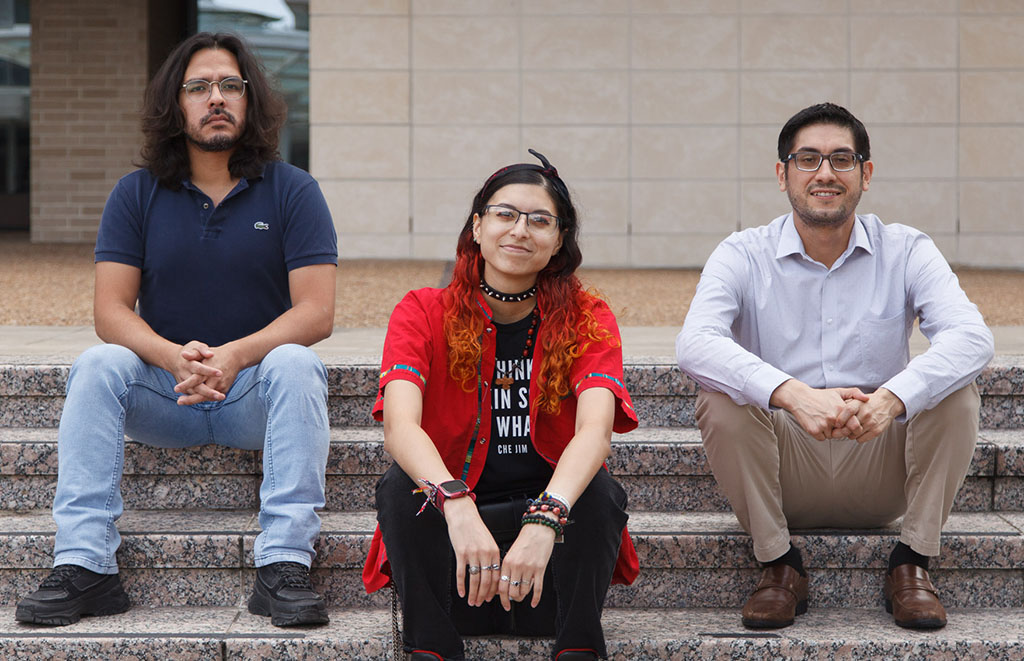Awardees Bring Representation to Labs While Mentoring Students
Graduate fellowships should not be taken lightly and are a major accomplishment. Three doctoral candidates within the University of Houston’s College of Natural Sciences and Mathematics are proving why they are worthy.

Lorissa Saiz, a biology Ph.D. student, and Gustavo Valdivia and Pablo Lopez-Duque, both physics Ph.D. students, have been honored with the Lydia Mendoza Fellowship from UH’s Center for Mexican American and Latino/a Studies. This is the second time Lopez-Duque has received an award from the center. CFE International LLC sponsors the fellowship.
The program brings awareness to not only Mexican culture, but Latino culture as well. Students receiving the fellowship must show how they help others in the Latino community through service, training, advising, research, and teaching. Saiz and Valdivia were awarded $16,500 for the full year; Lopez-Duque received $8,250 for the fall semester.
Lorissa Saiz: Bringing Awareness to Cultural Differences in STEM
Saiz, from Houston, studies evolutionary genetics, with a background in quantitative genetics. While completing her studies, Saiz also serves as president of the UH chapter of the Society for Advancement of Chicanos/Hispanics and Native Americans in Science (SACNAS) and is a current student board member of the national program. Through SACNAS, Saiz advocates for diversity in STEM academics.
“It is really important to have people with different perspectives and backgrounds involved in scientific conversations,” said Saiz. “That’s how we push things forward.”
Saiz mentored several students while studying at UH, adding it’s something she is proud of.
“Lorissa has worked tirelessly to build a supportive STEM community at UH, not only for Latino and Native American students, but for all students. She is a leader in every sense, and it is wonderful to see her efforts recognized in the form of this fellowship,” said Erin Kelleher, Saiz’s mentor and an associate professor of biology.
When asked about challenges the Latinx community faces in STEM, Saiz said there is a lack of representation for future students to look up to. However, she hopes others will find inspiration through her work as she advocates for more diversity in STEM education and research.
Gustavo Valdivia: Providing Support for New Latinx Physics Students
Valdivia studies theoretical physics, including quantum foundations and black holes. As a native of Peru and a Latino in STEM, Valdivia said he tries to help students who are from Latin American countries integrate into Houston and advises some in their research.
One obstacle some Latinx students face is a language barrier, especially if there is a “sense of inferiority.”
“We are just as capable as anyone else and have a high level of education potential,” he said. “Being a top student and working hard in my research demonstrates the capabilities of Native American descendants.”
Thanks to the fellowship, Valdivia can dedicate his time to his research supervised by Carlos Ordóñez, professor of physics.
Pablo Lopez-Duque: Showing How Representation Matters in Latinx Community
Lopez-Duque, who will graduate in December 2024, studies quantum computing in the Department of Physics thousands of miles away from his native Ecuador. According to Lopez-Duque, quantum physics and quantum information can be applied to many aspects of life.
“I think it’s very important that while doing research, I participate in outreach projects. Not having enough representation is also a barrier that you see, and that’s why it’s important to have this outreach,” said Lopez-Duque. “I feel for Latinos there is a stigma surrounding difficulties in mathematics.”
His efforts include helping organize educational projects for high school students interested in physics and mentoring students at a quantum science camp in Wyoming. Lopez-Duque also worked with UH undergraduate students who needed mentorship.
“I couldn’t be prouder of both of them,” said Ordóñez, who is also the mentor for Lopez-Duque. “They’re both very smart and also great people and good individuals.”
- Ashley Byers, College of Natural Sciences and Mathematics